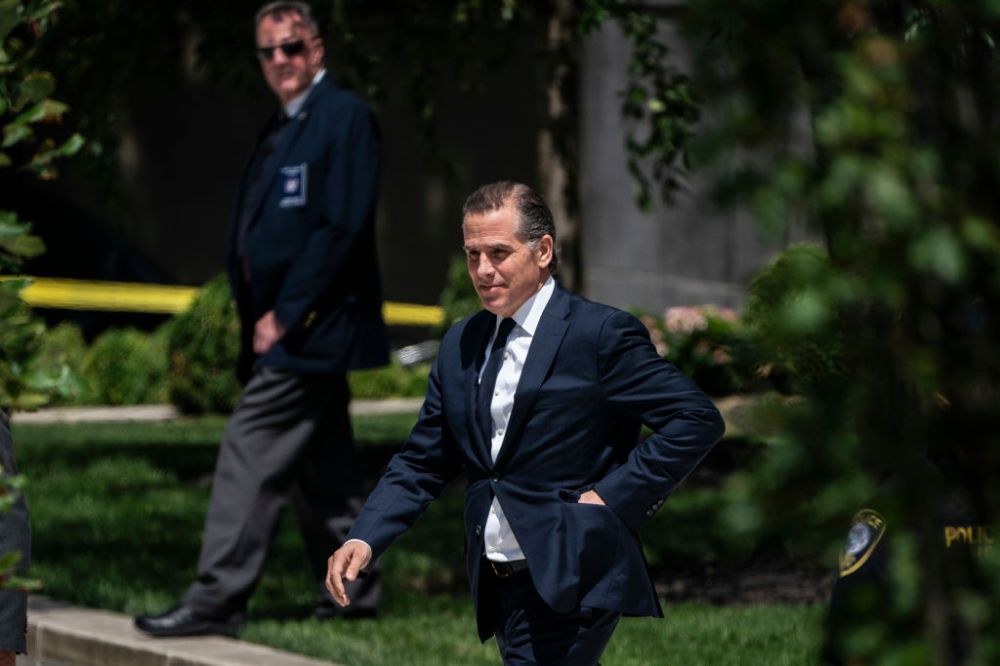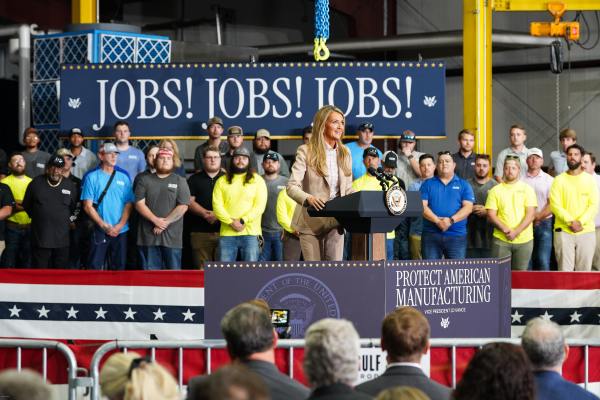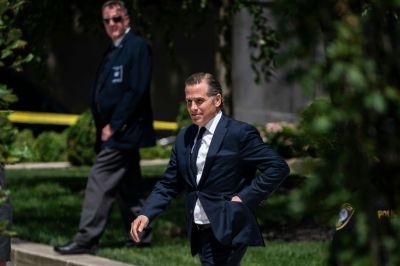Hello and welcome once again to The Collision. This week, we’ll get into both Donald Trump’s civil trial and developments in the impeachment inquiry into Joe Biden.
The Docket
- Ivanka Trump testified Wednesday in a Manhattan courtroom, becoming the third adult child of Donald Trump to testify in the ongoing civil trial. New York Attorney General Letitia James has alleged Trump and his co-defendants committed fraud by inflating the former president’s wealth. Ivanka is the final of 25 witnesses called by James (including Trump himself, more on that below) to provide testimony in the trial, but she is not a co-defendant like her brothers Donald Jr. and Eric. Unlike her father and brothers, Ivanka was “cordial” and not combative, James said. Trump’s defense will begin to argue its case next week. The presiding judge, Arthur Engoron, already issued a summary judgment before the trial began that Trump had committed fraud. The trial will help Engoron determine how much Trump will have to pay in damages and what limitations will be placed on the Trump Organization.
- On Tuesday, special counsel David Weiss appeared voluntarily before the Republican-led House Judiciary Committee—a remarkable move for a lead investigator still in the middle of a criminal probe. In the seven-hour closed-door hearing Weiss, who is leading the Justice Department’s investigation into Hunter Biden, reportedly testified that there had been a “misunderstanding” about his autonomy in the role. Republicans have accused the Justice Department of dragging its feet on investigating the president’s son. “I am, and have been, the decision-maker on this case,” Weiss said, according to CBS News. “At no time was I blocked, or otherwise prevented from pursuing charges or taking the steps necessary in the investigation by other United States Attorneys, the Tax Division or anyone else at the Department of Justice.” Weiss began his investigation into Hunter Biden during the Trump administration, when he had been appointed U.S. attorney for Delaware, and he stayed in the role into the Biden administration.
- Republicans left the Tuesday interview grumbling that Weiss was not as forthcoming as they’d like, particularly regarding whether his investigation had ever been impeded by the Biden Justice Department. Chairman Jim Jordan said that Weiss testified that he had requested a “special attorney” status in the spring of 2022 and had been denied at the time by his superior at Justice—though Weiss still insisted he was not stymied in his investigation. In a June 2023 letter to Sen. Lindsey Graham, the Republican ranking member on the Senate Judiciary Committee, Weiss wrote that he had not yet requested “special counsel” status, which is derived from a separate statute governing special investigations, but that he had been “assured” by higher-ups at Justice that he would receive such a status if it became necessary. Attorney General Merrick Garland appointed Weiss special counsel in August of this year, shortly after Weiss made the request.
- The other special counsel, Jack Smith—who is investigating Donald Trump’s actions surrounding the attempt to overturn the 2020 presidential election—and his team filed their opposition to a motion from the Trump legal team to throw out the case. The Trump motion argued, in part, that the federal government’s indictment made “prejudicial and inflammatory” references to the attack on the U.S. Capitol by pro-Trump rioters on January 6, 2021. In their filing this week, the prosecution said that the words and actions of Trump before, during, and after the riot are “relevant and probative evidence of the defendant’s conduct and intent.” The filing also makes it clear how the storming of the Capitol will be a central part of Smith’s case against Trump. As Politico’s Kyle Cheney notes, this strategy carries some risk, since judges in Washington who have presided over trials of January 6 rioters “have noted that Trump didn’t explicitly tell his supporters to breach barricades, commit violence or break other laws, and they’ve held repeatedly that defendants who sought to blame Trump for their illegal conduct were responsible for their own actions.”
A Subpoena for Hunter Biden
We’re back on the impeachment sub-beat here at The Collision, because House Republicans made a significant move in their otherwise slow-moving inquiry this week.
Rep. James Comer, the chairman of the House Oversight Committee and leader of the impeachment effort, issued subpoenas on Wednesday for Hunter Biden; James Biden, the president’s younger brother; and Rob Walker, a business associate of Hunter and James. Each has been summoned to appear before the committee for individual depositions: Walker on November 29, James on December 6, and Hunter on December 13.
This ratcheting up of the impeachment effort comes after weeks of chaos in House Republican leadership and a lone impeachment hearing that did not quite live up to the hype. In a statement, Comer made it clear that the line of inquiry for these subpoenaed witnesses will try to show a financial trail from Hunter’s business interests overseas to Joe Biden’s coffers.
“The House Oversight Committee has followed the money and built a record of evidence revealing how Joe Biden knew, was involved, and benefited from his family’s influence peddling schemes. Now, the House Oversight Committee is going to bring in members of the Biden family and their associates to question them on this record of evidence,” read Comer’s statement in part.
While Comer’s claims have often oversold the evidence, there remain knowable facts about Biden’s knowledge and involvement with his son’s business dealings. And the emerging fact pattern, as Politico’s Ben Schreckinger outlines in a lengthy article this week, is frequently in contradiction to the blanket denials from Biden and the White House. Here’s an excerpt:
Joe Biden and his representatives have repeatedly defended him from criticism related to his relatives, his son in particular, by issuing blanket denials of misconduct and disclaiming contact with their business affairs.
But, in recent months, as congressional Republicans have opened an impeachment inquiry and controversies related to Hunter Biden continue to be litigated in the courts and in the public square, a steady trickle of revelations have contradicted the president’s denials.
A POLITICO review of recent congressional testimony and exhibits, along with court filings and media reports, casts doubt on several statements made by Biden and his representatives.
They include the president’s claim that he has never discussed his relatives’ business dealings with anyone and his suggestion that the appearance of emails apparently belonging to his son was the result of a Russian plot, as well as Biden’s denials that his son made money from China and that his relatives have profited off of the Biden name.
Schreckinger’s story details the various ways that the body of evidence, including “congressional testimony and exhibits … court filings and media reports” cast doubt on Biden’s blanket denials about discussing his family members’ business arrangements or that Hunter Biden made money in China, and how Biden’s White House often recalibrates their denials as a result.
All of these contradictions do not amount to proof that Biden, either as vice president in the past or as president now, did anything in an official capacity to benefit himself or his family. But the contradictions demand some sort of resolution, and House Republicans are going to see if these subpoenaed witnesses can deliver the damning evidence they seek.
Democrats Remain Unmoved by Biden’s Contradictions
The partisan nature of the impeachment inquiry has given Democrats, meanwhile, all the license and political cover to ignore any of those contradictions. In conversations with The Dispatch this week, congressional Democrats seemed largely unmoved by these discrepancies between Biden and the record.
Rep. James Clyburn of South Carolina, an elder statesman in the House Democratic Caucus, dismissed questions about whether he believed Biden has been entirely honest about his knowledge of his son’s dealings.
“As I’ve said before and I’ll say again,” Clyburn said. “I’m a father of three daughters. He’s being a father to his son.”
Democrats on the Oversight and Judiciary Committees, whose Republican counterparts have been leading the investigations, were similarly dismissive of questions about Biden’s forthrightness.
“The president’s a person of integrity,” said Rep. Ro Khanna of California and a member of the Oversight Committee.
“There’s a lot of swirling information that goes around,” said Rep. Lucy McBath of Georgia, who sits on the Judiciary Committee. “And I think that the president and his staff will do exactly what they believe they need to do, you know, put out the narrative that is the truth.”
Pressed about whether she thinks Biden has been forthright, McBath responded that she “can’t say.”
Democrats also argue that Republicans’ sweeping claims have “muddied” the line between when Biden was a private citizen and when he was in government.
“What is most important here is what occurred while the president is serving in public office. To date, I have not seen anything that would indicate any contradiction of facts,” said Rep. Alexandria Ocasio-Cortez of New York, who also sits on the Oversight Committee.
If Republicans hope to move forward on articles of impeachment and to convince at least some Democrats to jump on board, they still have a lot of work to do.
Sarah’s View
As mentioned in The Docket above, the state rested its case in its civil fraud trial against Donald Trump this week. Trump’s legal team will have to decide how much longer the case continues and what kind of defense it plans to mount. But politically, I don’t think it matters much at this point. With four criminal cases pending, this trial was always little more than an amuse-bouche.
Declan Garvey—of Morning Dispatch fame and now the executive editor of The Dispatch—asked me what communications advice I would have given Trump for his civil fraud trial and how closely it would have mirrored these past two weeks. In truth, I would have done more. More press conferences on the courthouse steps, more TV interviews focused on the underlying allegations, and more … Trump.
Politically, Trump is at his weakest when he looks like he’s bobbing along the water. After all, the entire purpose Trump serves for Trump voters is to have someone who will “fight back.” When Trump is at his best for these voters, he is Gulliver and everyone else is the Lilliputians—just inches in height yet filled with arrogance and self-importance. The more they scurry and struggle to tie him down, the smaller and more pathetic they look as Gullivar breaks their ropes without even trying. In that sense, Trump taking the stand isn’t helpful. The ropes—of the legal system—are effectively pinning him down.
That’s why I was surprised that Trump and his lawyers didn’t try to make this more of a circus so that the headlines about his actual time on the stand would barely register. And let’s be clear, they did a decent job. I’ve seen far more about his Truth Social posts than I have about Trump raising his right hand before hopping in the witness box. The absence of cameras helped as well. But remember, his supporters don’t see his legal troubles as disqualifying. They are, at least to some extent, part of the appeal.
So, if you’re asking what I would have done differently—if my only goal were to continue to shore up support in advance of the Iowa caucus in two months—I’d have tested the tensile strength of the Lilliputians’ gag order to focus the media, and voters, over there.
The fact that they didn’t is interesting and perhaps speaks to how little they think this trial matters at all. And, of course, there’s plenty of good legal arguments for not violating the gag order, including the fact that they are currently appealing another gag order in the criminal case in D.C. And that gag order is much more important to Trump’s political future. So maybe, just maybe, Trump was actually listening to good advice this week.








Please note that we at The Dispatch hold ourselves, our work, and our commenters to a higher standard than other places on the internet. We welcome comments that foster genuine debate or discussion—including comments critical of us or our work—but responses that include ad hominem attacks on fellow Dispatch members or are intended to stoke fear and anger may be moderated.
With your membership, you only have the ability to comment on The Morning Dispatch articles. Consider upgrading to join the conversation everywhere.